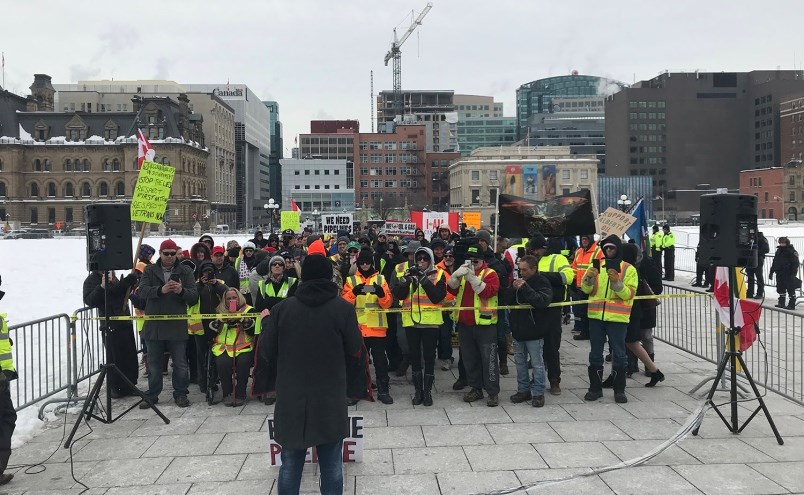The campaign was aimed at uniting Canadians behind resource development, but an Alberta-led 200-truck pro-pipeline rally that rolled from the west to the capital in February exposed a gap in how groups in favour of and against pipelines are supported.
United We Roll relied on private donations and the trucker’s own pockets to fuel and feed the 2,200-kilometre-long campaign.
“Any donation, big or small is graciously accepted,” was the message on its GoFundMe site that raised about $145,000, mostly from individuals. Along the route, regular Canadians donated food and money. Some motels provided discount room rates to United We Roll drivers.
Made up mostly of oil workers and truckers from Alberta and Saskatchewan, the eastbound protestors were concerned about the lack of government action on pipeline construction and proposed federal legislation that seeks to change – and perhaps sharply curtail – future energy project approvals, organizers say.
Recent surveys confirm that the majority of Canadians support pipeline expansion, and last year the federal government paid $4.5 billion in a so-far vain attempt to get the stalled TransMountain pipeline built from the oil sands to the B.C. coast.
Yet, while the United We Roll campaign did not receive a dime in government support, anti-pipeline groups and their legal teams pocket thousands of dollars in federal funding.
“We would have never asked the government for money,” said Glen Carritt, a trucker from Innisfail, Alberta, and key organizer of the pro-pipeline drive. “We are protesting against the government.”
When United We Roll arrived in Ottawa it was snubbed by the prime minister and met by a small group of anti-pipeline protestors.
Even if the government had offered it money, United We Roll would not have accepted it, Carritt said. “That would dilute our message,” he said.
An investigation by Business in Vancouver, sister paper of Western Investor, reveals that anti-pipeline groups, many of them already well-funded environmental organizations, have no such qualms.
They regularly receive Canadian tax dollars to help back their anti-pipeline actions.
Some of these groups have also received substantial funding from large U.S. philanthropic groups as part of the campaign against the Alberta oilsands.
Stand.earth, Georgia Strait Alliance, Living Oceans Society and Raincoast Conservation Foundation each received $80,000 from the National Energy Board just to participate in the recent reconsideration hearings, according to the NEB.
Fifty-one First Nations and Métis groups, including those opposed to pipeline expansion, also received $80,000 each.
That would’ve bought a lot of fuel, food and support for United We Roll truckers.



